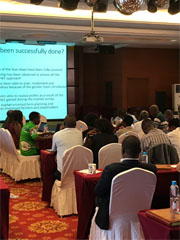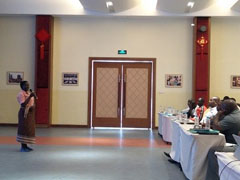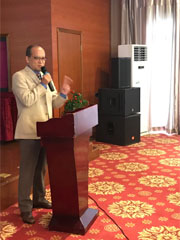Project News
2020-03-05
National MA-SHEP workshop was held
For two days from March 4 to 5, 2020, National MA-SHEP workshop was held in Lilongwe. The staff of Agricultural Development Divisions and District Agriculture Offices from nationwide as well as agricultural-related projects and university participated. They shared achievements and challenges on MA-SHEP/SHEP pilot activities. In this workshop, farmers who made good results were also invited and total number of participants was 123 people. This is the third workshop since the project started. Compared with the past workshops, more concrete outcomes were presented by target and non-target districts.
In the first day, the farmer groups which were selected in the first year presented their successes. They have changed from conventional farming to commercial farming by utilizing techniques which they have learnt from MA-SHEP and have also increased their cultivation land. A district MA-SHEP Management team also mentioned that the farmers changed their minds to work together as unit of household through gender awareness training. Moreover, they spent income for rehabilitation of houses, irrigation pumps and livestock under joint decision making. This means that equal partnership has contributed to reinvesting in both agricultural and non-farming activities. In addition, it was confirmed that a number of farmer groups have been increasing by utilizing government budgets under the initiative of the first batch districts. In the second batch target districts, several positive impacts have already emerged on the ground. For example, a farmer in Rumphi district has effectively utilized the small arable land and harvested tomatoes twice a year. This farmer purchased second hand car from profits of tomato sales. When this case was presented, praise and surprise arose from the audience.
On the second day, stakeholders form non-target districts and target farmers were invited to share the outcomes so far. The target farmers presented their activities and positive changes. For example, a female farmer, Ms. Emily Mbuna from Nkhotakota district, explained how her family has positively changed through MA-SHEP activities. As a result of gender awareness training, it was reported her husband came to ask and discussed together with her what to grow and how to spend income. Consequently, they managed to build a good house, to buy a motorized pump and to pay for the children's school fees.
On the other hand, MA-SHEP activities are still halfway through. Some district staff stated that one of the serious challenges is "some farmers still have dependency syndrome". In order to tackle the challenge, the project manager (Mr. Pearson Soko) responded that it is important for farmers to think and act by themselves instead of relying. Finally, all the participants confirmed that they should go further ahead to continue MA-SHEP/SHEP activities in collaboration with government staff, related organizations and stakeholders. This workshop was very fruitful.
 Group presentation on MA-SHEP activities
Group presentation on MA-SHEP activities
 A farmer, Ms. Emily Mbuna from Nkhotakota district presenting the outcomes of the MA-SHEP activities
A farmer, Ms. Emily Mbuna from Nkhotakota district presenting the outcomes of the MA-SHEP activities
 Opening Remarks by Mr. Kito, Resident Representative of JICA Malawi Office
Opening Remarks by Mr. Kito, Resident Representative of JICA Malawi Office
- About JICA
- News & Features
- Countries & Regions
- Our Work
- Thematic Issues
- Types of Assistance
- Partnerships with Other Development Partners
- Climate Change / Environmental and Social Considerations
- Evaluations
- Compliance and Anti-corruption
- Science and Technology Cooperation on Global Issues
- Research
- JICA Development Studies Program / JICA Chair
- Support for the Acceptance of Foreign HRs / Multicultural and Inclusive Community
- Publications
- Investor Relations
